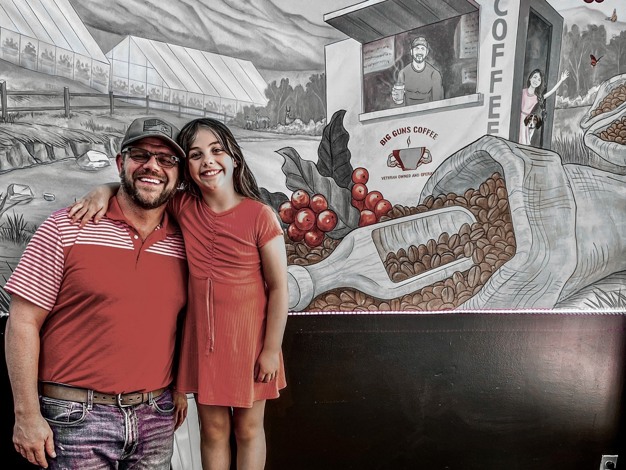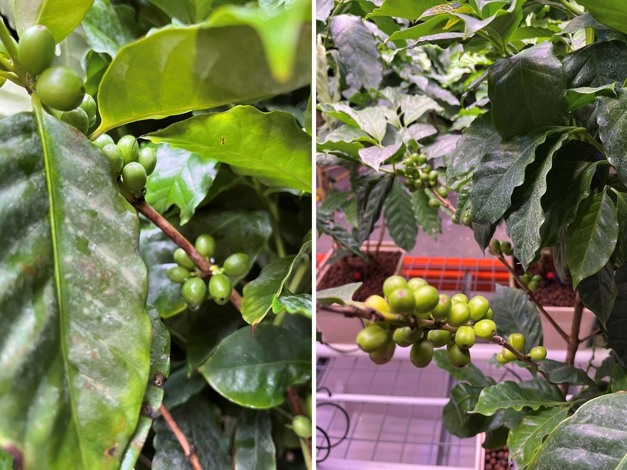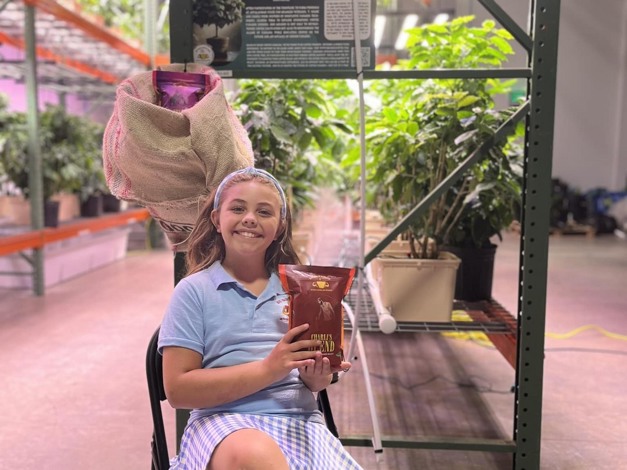“Nobody wants to go in and see lettuce. Lettuce is lettuce, but coffee is an experience. It’s fruit, it’s cherries, it’s color, it’s travel, it’s culture. It’s a story. And if we can get people through the door with that story, we can show them what this kind of farming is truly capable of,” says T.Shane Johnson, Co-founder and CEO of Big Guns Coffee and Farm.
In a retrofitted college space in North Carolina and a former grocery store in Landrum, South Carolina, USA, T.Shane and his 10-year-old daughter, Charli, are growing coffee plants indoors. A few years back, Charli came running to her dad with the idea of starting a family-run coffee brand. Soon, a 38-blend strong coffee line was launched, which the Johnsons were roasting, packing, and selling off into North Carolina. “Eventually, we thought, ‘why don’t we grow the plants ourselves?’ Four years later, we grow it, we roast it, we serve it, and we recycle it,” T.Shane says with a grin.
 TShane and Charli Johnson
TShane and Charli Johnson
“This farming side of it is really intriguing. It’s nothing new, but it’s about getting the consumer excited and educating them about how growing coffee indoors allows us to create an extraordinary product,” he says. With increasing tariffs and pricing volatility in the global coffee trade, Big Guns is tapping into a resilient supply chain.
Inside the 300 m2 indoor farm, the father-and-daughter duo have successfully grown and harvested coffee. Now, they’re entering the flowering stage with 134 varieties, each with its own growth profile and flavor characteristics. “We’re at just 25% of our output potential. The trees are exploding but are flourishing beautifully. Since it’s just the two of us right now, we’ve been bootstrapping everything, which has proven itself thus far,” he admits.
So, why not opt for a greenhouse and go fully indoors? “We needed blackout capability,” T. Shane explains. As he explains, pollinating coffee plants is a complex process. At Big Guns, they’re using bees for the process; however, they would easily get lost or escape in a greenhouse. “Indoors, we can control their activity. On top of that, we’re playing around with the idea of caffeinated honey to dive into product diversification. We like to blend a bit of old-school knowledge with modern technology.”
 The coffee crops
The coffee crops
Farm-to-cup
The customer part is still in the making, T.Shane explains. Having proved the concept works, he likes to scale the farm and figure out whether to go niche or supply the broader public. T.Shane aspires to create a café-meets-farm experience that taps into agro-tourism, or the mass market. “Thus far, we received ‘plenty of yeses’ from retailers like Sprouts and Walmart. Unfortunately, we don’t have enough beans yet to meet that kind of demand,” he comments.
“However, I’m seeing a lot of opportunities. Our core advantage is that we’re producing a premium, hyper-local product that resonates with consumers’ growing appetite for knowing where their product comes from, and most importantly, the quality.” T. Shane continues to explain that coffee is a self-care luxury people don’t mind spending some money on. By controlling the supply chain from ‘farm to cup’, Big Guns hopes to deliver that reliability. “People want good coffee. And if it’s locally grown, even better.”
 Charli seen in the farm
Charli seen in the farm
“While vertical farms producing lettuce or herbs have become familiar to retailers and consumers, coffee adds a whole new flavor, literally and metaphorically. Nobody is excited to see kale growing under lights. But coffee? It’s exotic, it speaks. You can hook people with coffee and then talk to them about systems, sustainability, and how we can replicate this across rural America,” T. Shane points out.
As for the future, Big Guns foresees a business model where vertical farms are paired with co-op programs. Potentially café retail as well, even linked to big-box store partnerships. “Imagine harvesting your coffee on-site and sipping it minutes later,” T.Shane says, smiling.

A proven concept
“Despite having found a unique product that is appealing to the consumer, indoor farming is still new, and funding is hard to come by,” T. Shane admits. “You can have the best product, but if you can’t get out of the farm and tell your story, it won’t reach the shelves. For us, storytelling isn’t a ‘nice-to-have’; it’s the business model. We’re a different entity altogether. A premium product with a mission to educate. And we’re just getting started.”

For more information:
Big Guns Coffee Farm
T.Shane Johnson, Co-founder and CEO
+1 828 440 1385
[email protected]
www.biggunscoffee.com
Source: The Plantations International Agroforestry Group of Companies
